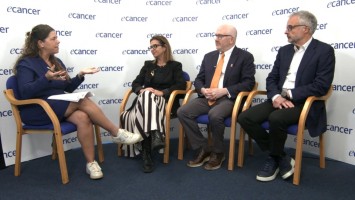4th EUTROC
Interaction between tumour biology and surgery
Dr Christina Fotopoulou – Charite University Hospital, Berlin, Germany
I am leading the surgical part in EUTROC, the surgical trials and the surgical working group where we will try in the future to implement translational research in the surgery against ovarian cancer. So what I presented yesterday was an overview of tumour biology, of interaction between tumour biology and surgery. We actually have to admit that nowadays surgical effort is being challenged worldwide and the value of surgery in ovarian cancer is being very broadly discussed. We know that patients operated with no macroscopic tumour residuals have a significantly better survival than those operated sub-optimally, however there are some results which imply that the neoadjuvant approach would be better in terms of a better morbidity. So there is a big shift towards lower radicality in surgery in terms of a delayed primary debulking. So what we discussed yesterday was the various hypotheses – why a patient with ovarian cancer is being operated, what are the backgrounds? There are some theories that the resistant clones of the disease pre-exist also in the initial stage, so from the outset of the disease. So surgery would try ideally to remove all these resistant clones so that they won’t be able to recur so that you have a patient who will respond excellently to platinum and then never recur again in an ideal phase, which of course is far away from reality. We also know that surgical effort is not enough in 20% of the patients who can’t be operated tumour-free because of the tumour pattern dissemination which doesn’t allow us to achieve a complete macroscopic freedom.
We have also some other factors that are being investigated right now like sub-types of histology; the role of cytokines; interleukin factors. There are some theories that some factors, according to their level, they bring more infiltrative growth of the tumour which prevents us, as surgeons, to remove it. So it’s far more complicated than just saying a good surgery, a good surgical effort brings a better outcome; we just also need to examine the various aspects of the tumour dissemination pattern which, of course, will have a significant impact on the outcome.
Have there been any recent trials?
Yes, there is a big EORTC trial presented by Ignace Vergote two years ago in the New England Journal of Medicine where we saw that in the adjuvant surgery after three… so in the adjuvant chemo and chelate primary debulking after three cycles have actually the same survival impact as primary debulking. There was a trend of lower morbidity which failed to retain any significance at the end. So one could be afraid that many people could take that as an excuse of low effort surgery because also seeing this trial a sub-analysis of countries with less radicality had actually even a worse outcome in the neoadjuvant group, so had a better outcome in the primary debulking group. I saw a slide where you can imagine the tumour, the platinum sensitive disease, as a big bowl and they are flagging the small resistant clones which you can’t actually otherwise see. So when you have chemo, especially after more than three cycles, you don’t have this help of visibility of big tumours so that you don’t really know which boundaries you have to operate.
There is now the ICON8 trial which will again examine this matter of primary versus delayed so we will definitely have next year some results. We also have the big DESKTOP 3 trial which is running from the German AGO group where we’re going to establish for the first time worldwide, together with another GOG trial, the value of surgery reduction and secondary debulking which is going to be very important. So the future is open and we need many more questions to be answered.
What are the clinical implications of these studies?
Currently the management of patients with ovarian cancer varies very broadly and it depends very much on which country and in which centres will present for this treatment. So ideally we’d have homogeneous guidelines where all these patients will have the ideal treatment, will receive the ideal treatment, no matter where they present. In the UK the good is that you have big specialised centres which treat these patients; in Germany any hospital can operate on ovarian cancer and can say that they perform these big advanced multi-viscera surgeries which, of course, are of lower quality and associated with higher morbidity. So we need to move towards big gynaecological oncological centres in order to have a better treatment for these patients and have homogenous results in order to establish international guidelines that will be more homogeneous than now.








